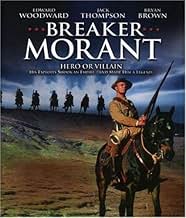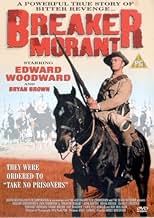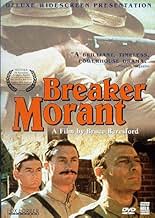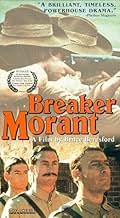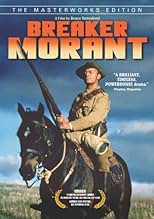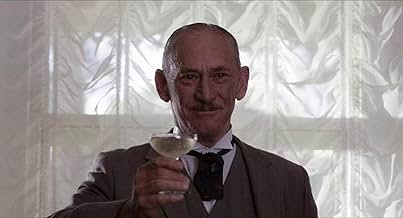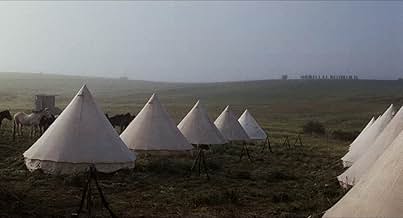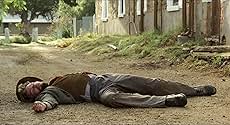NOTE IMDb
7,8/10
15 k
MA NOTE
Trois lieutenants australiens sont traduits en cour martiale pour avoir exécuté des prisonniers afin de détourner l'attention des crimes de guerre commis par leurs supérieurs.Trois lieutenants australiens sont traduits en cour martiale pour avoir exécuté des prisonniers afin de détourner l'attention des crimes de guerre commis par leurs supérieurs.Trois lieutenants australiens sont traduits en cour martiale pour avoir exécuté des prisonniers afin de détourner l'attention des crimes de guerre commis par leurs supérieurs.
- Réalisation
- Scénario
- Casting principal
- Nommé pour 1 Oscar
- 13 victoires et 8 nominations au total
Charles 'Bud' Tingwell
- Lt. Col. Denny
- (as Charles Tingwell)
Avis à la une
It's one of the most delightful experiences to watch a movie you know completely nothing about and it turns out to be one of the best surprises in a long time. This was the case with "Breaker' Morant". I dont even know why I bothered to watch it, since it sounded like a truly boring Australian war movie, but boy was I wrong and consequently glad I DID bother. Some of the acting and the script are truly Oscar-worthy and the photography and camera movements were truly outstanding on many occasions, taking the whole movie onto another level of experience. And not to forget, the poetry recited through the movie is brilliant. I wonder if it truly got published. 8/10
After first encountering "Breaker" Morant during a bout of insomnia in 1984 on cable, I have repeatedly come back to this film as one of my all-time classics--covering war, politics, tactics, transitions to manhood involved in all wars--and injustice.
Although set during the Boer War, the account of three officers tried for murder during a war in which the opponents were dressed as civilians has its obvious parallels to the 21st Century. It is absolutely amazing how similar a court marshal can be out on the "velt" of South Africa, in Washington, D.C., or during a purely uniformed war in which all protagonists are easily identifiable.
Three Australian volunteers for the "Bushvelt Carbineers", recruited to fight against civilian-clad commandos (reportedly the first use of the term), find themselves charged with murder, and set as an example by the British in order to prevent Germany from entering the war on the side of the Boer (Dutch) inhabitants of South Africa. In one incredulous encounter between a British officer and Lord Kitchener, the officer spouts the British line "they lack our altruism" (referring to German interests in the gold and silver mines of South Africa), to which Lord Kitchener grudgingly responds, "Quite." A sham trial from start to finish, the Australians are defended by military attorney with experience in "land conveyancing and wills" to which one of those charged, "the latter might come in handy." The film is replete with irony and tragicomic circumstances, as this "new war for a new century" presages many of the conflicts that would come later in the 20th century, and many of the clear paradoxes and trying aspects of the war against terror--again, in which one side is not uniformed, does not conduct war according to any known "rules" of "civilized warfare" (an oxymoron if ever there was one). It has lost none of its cutting edge in the 25-odd years since its release.
Although set during the Boer War, the account of three officers tried for murder during a war in which the opponents were dressed as civilians has its obvious parallels to the 21st Century. It is absolutely amazing how similar a court marshal can be out on the "velt" of South Africa, in Washington, D.C., or during a purely uniformed war in which all protagonists are easily identifiable.
Three Australian volunteers for the "Bushvelt Carbineers", recruited to fight against civilian-clad commandos (reportedly the first use of the term), find themselves charged with murder, and set as an example by the British in order to prevent Germany from entering the war on the side of the Boer (Dutch) inhabitants of South Africa. In one incredulous encounter between a British officer and Lord Kitchener, the officer spouts the British line "they lack our altruism" (referring to German interests in the gold and silver mines of South Africa), to which Lord Kitchener grudgingly responds, "Quite." A sham trial from start to finish, the Australians are defended by military attorney with experience in "land conveyancing and wills" to which one of those charged, "the latter might come in handy." The film is replete with irony and tragicomic circumstances, as this "new war for a new century" presages many of the conflicts that would come later in the 20th century, and many of the clear paradoxes and trying aspects of the war against terror--again, in which one side is not uniformed, does not conduct war according to any known "rules" of "civilized warfare" (an oxymoron if ever there was one). It has lost none of its cutting edge in the 25-odd years since its release.
This movie shows what a truly hellish thing war can be. Where no rule but rule `3-0-3' exists. A lot of films show war in one slant or another, glorious or horrific. This one just shows it for what it is. A damned horrible mess. Many of the actors are some of Australia's finest and this movie is a credit to their skill and talent. It has simple production values but it is elevated by their acting abilities and the great script. A definite must for those who favor the war genre in films, and a measuring point for those who seek to make a film about war and the people caught up in it.
"'Breaker' Morant" is based on true events, and deals with the court-martial of three subalterns during the closing stages of the Second Boer War (1899-1902). The officers are members of a mostly Australian unit called the Bushveldt Carbineers, created to fight the Boer commandos (in the original sense of the word) by employing their own tactics against them. The charges against them are that they committed murder by summarily executing captured Boers. That they have done so in not in question, but in their defence they argue that they were acting in accordance with standing orders, not least because the operational nature of the Carbineers would be hampered by having to keep prisoners under guard. The British command is keen to distance itself from this claim for various reasons; it might galvanise Boer resistance, and give Germany an excuse to provide material support to the Boers (thus extending a war which was already a serious drain on the British Empire's resources), and (though this is left unsaid in the film) cause discontent about the conduct of the war in those parts of the Empire supplying the manpower for the war, i.e. Britain, Australia and Canada. Instead, the British command clearly wishes to portray the three protagonists as "rogue elements" and sacrifice them for the sake of political expediency.
"'Breaker' Morant" is about injustice, hypocrisy and incomprehension. The injustice is not that lieutenants Morant, Hancock and Witton are innocent of the charges brought against them--they're not. The Second Convention of The Hague may have been only two years old at the time, but the custom of not killing prisoners was well-established long before, and at no point do we see any of the protagonists object to the standing orders. The injustice lies in the fact that the body which is trying them for their crimes--the British army--is the very body which ordered them to commit these crimes in the first place.
The incomprehension is that of the home front; in a brief flashback of Witton's relatives giving a going-away party, we see the expectation among the civilians that "our boys will knock 'em for six" but behave like gentlemen while doing so. Brief as the scene is, it is plain that the civilians understand only in the most abstract way, if they understand at all, that war is a messy business in which winning requires killing people in unpleasant ways. As Major Thomas, the protagonists' defence counsel, comments, "The barbarities of war are seldom committed by abnormal men. The tragedy of war is that these horrors are committed by normal men in abnormal situations." While I can agree with this observation, it does not alter the fact that the acts committed by the protagonists were of such a nature as to be have been formally outlawed, even within the context of war, two years previously.
Another trope, which occurs in this film but repeated in every war of the 20th century, is that "only a combat soldier can judge another combat soldier." As it happens, I am a former soldier (who never saw combat) who later helped prosecute war criminals while a civilian; I think this line is unadulterated bullsh*t. That said, this opinion comes with a caveat, which is that those civilians and non-combat soldiers who would pass judgement should understand that expecting soldiers to both fight cleanly and to win may be (and often are) mutually exclusive.
Of course, standards have changed somewhat since 1901; when Morant remarks "it's a new kind of war, George; it's a new war for a new century," the difference he indicates is that it is the first time white men visit atrocities upon each other which both had been quite content to inflict upon non-whites for most of the previous century. At one point in the film, Lt. Hancock pulls a dum-dum round from a Boer's ammunition pouch as an indication of the Boers' disregard for the laws of war. However, a (somewhat apocryphal) story from the opening stages of the Boer War (not in the film) tells of how the Boers lodged a protest with the British after finding dum-dum rounds in a killed British soldier's ammunition pouch; the British reportedly apologised profusely, explaining that the soldier had been issued these rounds in error, as these were intended only for use against blacks. The Boers accepted this explanation without further complaint.
But however you may feel about the politics underlying this film, it is a joy to watch. The quality of the production values is top notch, and had I not been familiar with Edward Woodward and Bryan Brown, I could have believed this film was made this year, rather than in 1980. The directing and acting are also superb. At the heart of this is the script, which carried no dead weight of unnecessary scenes; likely, this is due to the fact that it was originally written (and written well) for the stage. The story might easily be transposed to any number of conflicts since the Second Boer War in which military victory demands taking nasty measures; it could easily be rewritten to Iraq in 2003 ("Well, Peter, this is what comes of empire-building."), and for that reason it deserves more recognition than it's received. Magnificent; see it ASAP.
"'Breaker' Morant" is about injustice, hypocrisy and incomprehension. The injustice is not that lieutenants Morant, Hancock and Witton are innocent of the charges brought against them--they're not. The Second Convention of The Hague may have been only two years old at the time, but the custom of not killing prisoners was well-established long before, and at no point do we see any of the protagonists object to the standing orders. The injustice lies in the fact that the body which is trying them for their crimes--the British army--is the very body which ordered them to commit these crimes in the first place.
The incomprehension is that of the home front; in a brief flashback of Witton's relatives giving a going-away party, we see the expectation among the civilians that "our boys will knock 'em for six" but behave like gentlemen while doing so. Brief as the scene is, it is plain that the civilians understand only in the most abstract way, if they understand at all, that war is a messy business in which winning requires killing people in unpleasant ways. As Major Thomas, the protagonists' defence counsel, comments, "The barbarities of war are seldom committed by abnormal men. The tragedy of war is that these horrors are committed by normal men in abnormal situations." While I can agree with this observation, it does not alter the fact that the acts committed by the protagonists were of such a nature as to be have been formally outlawed, even within the context of war, two years previously.
Another trope, which occurs in this film but repeated in every war of the 20th century, is that "only a combat soldier can judge another combat soldier." As it happens, I am a former soldier (who never saw combat) who later helped prosecute war criminals while a civilian; I think this line is unadulterated bullsh*t. That said, this opinion comes with a caveat, which is that those civilians and non-combat soldiers who would pass judgement should understand that expecting soldiers to both fight cleanly and to win may be (and often are) mutually exclusive.
Of course, standards have changed somewhat since 1901; when Morant remarks "it's a new kind of war, George; it's a new war for a new century," the difference he indicates is that it is the first time white men visit atrocities upon each other which both had been quite content to inflict upon non-whites for most of the previous century. At one point in the film, Lt. Hancock pulls a dum-dum round from a Boer's ammunition pouch as an indication of the Boers' disregard for the laws of war. However, a (somewhat apocryphal) story from the opening stages of the Boer War (not in the film) tells of how the Boers lodged a protest with the British after finding dum-dum rounds in a killed British soldier's ammunition pouch; the British reportedly apologised profusely, explaining that the soldier had been issued these rounds in error, as these were intended only for use against blacks. The Boers accepted this explanation without further complaint.
But however you may feel about the politics underlying this film, it is a joy to watch. The quality of the production values is top notch, and had I not been familiar with Edward Woodward and Bryan Brown, I could have believed this film was made this year, rather than in 1980. The directing and acting are also superb. At the heart of this is the script, which carried no dead weight of unnecessary scenes; likely, this is due to the fact that it was originally written (and written well) for the stage. The story might easily be transposed to any number of conflicts since the Second Boer War in which military victory demands taking nasty measures; it could easily be rewritten to Iraq in 2003 ("Well, Peter, this is what comes of empire-building."), and for that reason it deserves more recognition than it's received. Magnificent; see it ASAP.
When I watched this finely acted movie, I wasn't really too knowledgeable about the Boer War so I didn't know how historically accurate the film was. However, from reading the posts, it seems more knowledgeable posters then myself agree that the filmmakers were very authentic in their endeavors. Most pertinently, even though the story is about the General Staff scapgoating the three Australian lieutenants to cover their own practice of ordering Boer prisoners shot, in a war obviously long since concluded, its relevance is timeless and universal as soldiers in all times and places are asked to do things that conflict with their consciences. Breaker Morant shows this very powerfully. 9/10.
Le saviez-vous
- Anecdotes"We shot them under Rule 303" is a reference to the.0.303 inch (7.7 millimetre) cartridge used in British Army rifles.
- GaffesThe band plays an excerpt from Franz Lehár's The Merry Widow, which premiered three years after the trial took place.
- Citations
[last lines]
Harry Morant: Shoot straight, you bastards. - Don't make a mess of it!
- Crédits fousIntroducing Lewis Fitz-Gerald as George Witton.
- Bandes originalesAt Last
Traditional tune
Arranged by Jack Grimsley (uncredited)
Lyrics by H.H. Morant
Performed by Edward Woodward
Meilleurs choix
Connectez-vous pour évaluer et suivre la liste de favoris afin de recevoir des recommandations personnalisées
- How long is Breaker Morant?Alimenté par Alexa
Détails
- Date de sortie
- Pays d’origine
- Site officiel
- Langues
- Aussi connu sous le nom de
- 'Breaker' Morant
- Lieux de tournage
- Cactus Farm, Burra, South Australia, Australie(deserted farmhouse, Boer attack)
- Sociétés de production
- Voir plus de crédits d'entreprise sur IMDbPro
Box-office
- Budget
- 800 000 $AU (estimé)
- Montant brut mondial
- 948 $US
Contribuer à cette page
Suggérer une modification ou ajouter du contenu manquant


